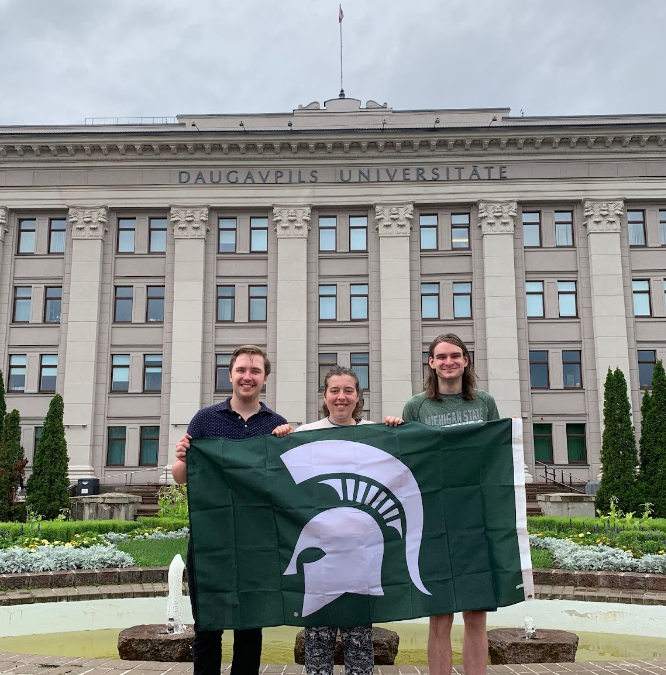Dr. Jonathan Choti, Assistant Professor in the Department of Linguistics, Languages, and Cultures, received the 2021-22 Network for Global Civic Engagement (NGCE) Grant to support a collaborative project in Naitolia Village of northern Tanzania. NGCE is a university-wide teaching and research collaboration founded by the Residential College in the Arts and Humanities (RCAH). Choti co-created the project with Mary Malekela of the University of Dar es Salaam (UDSM) and Naitolia Village. Malekela is the In-Country Program Officer of MSU’s Tanzania Partnership Program (TPP). TPP partners include MSU, UDSM, SUA (Sokoine University of Agriculture), and the villages of Milola and Naitolia. Naitolia is also the site of the TPP-sponsored summer education abroad program known as “Sustainable Community Development in Tanzania”, which Choti leads. Titled “Improving Food Security in Naitolia Village of northern Tanzania”, their project received a grant of $9,950 from NGCE. NGCE supports community-based research and practice in global civic engagement in the context of sustained, radically reciprocal, co-generative community-university partnerships. This support is possible through the generosity of the Michigan State University Federal Credit Union (MSUFCU), RCAH, and participating MSU colleges and major administrative units.
Project Purpose and Scope
This project addressed the acute problem of food insecurity in Naitolia Village of Monduli District. The project focused on three activities, i.e., (a) promoting drought-resistant, perennial vegetables, (b) training the community how to construct drip gardens, and (c) constructing drip gardens using dams (hafirs). Naitolia Village lies in an arid area that serves as a wildlife corridor. This community sits at the edge of Tarangire National Game Park, a location that makes it almost impossible to practice meaningful farming. The community’s major source of livelihood is herding, and their livestock include cattle, goats, and sheep. Naitolians produce maize and beans at a small-scale level. However, drought and wild animals thwart their farming efforts. Elephants, zebras, gazelles, wildebeests, and giraffes are the common herbivores in the area. Therefore, hunger and malnutrition are common problems in the community. This project introduced drought-resistant, perennial vegetables to address this problem. The project enabled families to plant vegetables such as Chaya, kisamvu (sweet potato vine), Russian comfrey, and New Zealand spinach. These vegetables can withstand drought, producing greens year-round with minimum water and few pests. The families located their gardens near kitchens to avoid being encroached by livestock and wild animals. This project enhanced home production of vegetables and thus helped combat hunger and malnutrition. The families may sell some of their harvest to buy groceries and other foods.
The TPP Village-Based Program Officer in Naitolia, Jonathan Kivuyo, led the implementation of the project. He facilitated the promotion of drought-resistant vegetables in the community. He trained the community on how to construct dams and drip gardens. The project enabled participants to purchase vegetable seedlings and seeds, build drip gardens, and acquire materials and water for the dams. Community leaders selected participating families based on a high degree of commitment as the major criterion. Drip irrigation technology relies on dependable water sources; hence, households had to commit to building homestead water harvesting technology. The project helped build 10,000-liter dams for each household using dam liner and agricultural cloth to ensure a steady water supply.
Core Project Principles
The development of this project followed the TPP and NGCE models of engaging local communities as equal partners in co-creating knowledge and co-experiential relationships that produce community change through innovative, reciprocal, global civic engagement activities. TPP and the in-country partners prioritize community issues. The community contributed labor, space, skills, water, and indigenous knowledge. NGCE has a particular interest in global civic engagement in the U.S. and abroad. and its mission is to develop sustained relationships through radical reciprocity, collaboration, and investment; and to address community engagement issues and implications in a global context. The NGCE’s overarching goal is to foster global peace and human security based upon mutual respect, independence, and cultural diversity. Tackling food insecurity in a remote community in Tanzania exemplified this principle.
Partners





Outcomes
The project started on June 6, 2022 and ended November 11, 2022. By the end of the project period, some families had started harvesting their vegetables. The photos below show the current stage of the project in some households.








